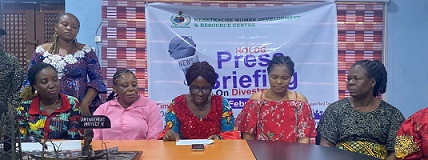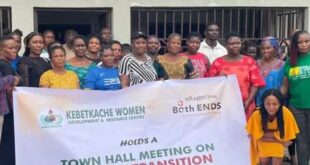By Kelechi Nwaucha
As Shell Petroleum Development Company (SPDC) and other multinational oil companies begin to divest their onshore holdings in Nigeria, women in the Niger Delta have cried “No,” demanding that the oil giants “Restore our land before leaving.”
Rising from a meeting held in Port Harcourt, under the aegis of Kebetkache Women Development and Resource Centre as part of the Power Up Project in Nigeria, community women from Ibeno in Akwa Ibom State, Eleme, Abua, Egbema in Rivers State and Delta State, described the situation as a “use, despoil and dump situation.”
“Now they (oil companies) want to pack and leave us? It is like a woman who has labored for her husband all the years, and all of a sudden he has seen a new wife, he wants to leave her. He will pack out of the house and go and live with that one. We are saying ‘No’ to it. Thank you very much. Unless they come and remediate our land. Let it be what it used to be, then they can go.” — Patience Osaroejji, representative of Mba Okase Women in Eleme, Rivers State.
In a statement signed by Dr Emem Okon, executive director of Kebetkache Women Development & Resource Centre, Peace Mgbenwa (Okwuzi Women Association), Glory Alexander (Ibeno Women), Dr Patience Osaroejji (Mba Okase Women in Eleme) and Enighe Elo (Abua Women Association), the Niger Delta women said are “very much worried and concerned about the swift nature of this divestment plans.”
Dr Okon and others said their worry stems largely from the fact that “government has not provided guidelines that ensure all the pollution issues are resolved before SPDC and AGIP and Total Energies will go. The companies in question have not set up women development funds to take care of the women that have suffered the consequences of their oil extraction business.”
According to the statement, “The Power Up Project in Nigeria implemented by Kebetkache Women Development & Resource Centre and the allied community-based women organizations in the project sites has noted with dismay the announcement by Shell to sell off their assets to investors without necessary consultations with communities that have suffered decades of environmental destruction from their operations. We have noticed that decision has been taken to sell Shell Petroleum Development Company (SPDC), to a consortium of investors, Renaissance Africa Energy. Already, SPDC has divested OML 17 and OML 29 without guidelines.
“Similarly, Nigeria Agip Oil Company (NAOC), Exxon Mobil Nigeria Limited, and Total Energy Nigeria Limited, are also set to divest all their onshore assets without engaging host communities and correcting damages done to the environmental and peoples’ wellbeing. They are running away ol
“As affected women in the Niger Delta we are very much worried and concerned about the swift nature of this divestment plans, because we know that government has not provided guidelines that ensure all the pollution issues are resolved before SPDC and AGIP and Total Energies will go. The companies in question have not set up women development funds to take care of the women that have suffered the consequences of their oil extraction business,” they said.
Okon and others noted that “Women in the Niger Delta, clearly suffer the deprivations engendered by oil exploitation. Women play significant roles in earning the family’s subsistence income through agricultural activities, they are also required to process farm produce for meals and trade the, balance for income. These gendered engagements with the environment forces women to navigate ecologically degraded and crude oil affected swamps to gather periwinkles, collect firewood, fetch water, fish, etc.
“Crop yields have also been seriously impacted, with steady decline in the harvest of crops like yams, cassava and plantain. On some occasions, harvested tuber crops have been found to contain crude oil deposits in them. The intensity of pollution from crude oil extraction activities has directly affected the productivity of women’s income generating activities and engendered an alarming rate of poverty.”
They stressed that women in the region “do not know the reputation of new companies buying the assets of Shell and AGIP,” while pleading with government that “we hold you in high esteem and we encourage you not to approve the divestment plans of Shell and AGIP and Exxon Mobil until polluted farmlands are cleaned up and restored by shell and AGIP and Exxon.
“Gas flares are going on in Ebocha, Ibeno, Umuechem, and many other places. Women in Otuabagi community are still suffering impacts of oil extraction.
“Farming does not work again! Fishing business is affected. Hunting has also suffered. Women have experienced health problems as a result of exposure to hydrocarbons! The manner of this divestment is not in the interest of community people. The right things should be donel
“We condemn this attempt by the International Oil Companies to abandon the responsibility of restoring the damaged ecosystem in the guise of selling off assets. We use this opportunity to call on the President of the Federal Republic of Nigeria to ensure there is No Divestment Without Ecosystem Restoration!
“Government should ensure that companies divesting their oil assets commit to cleaning all polluted sites in the Niger Delta and restoring lost livelihood opportunities. The Power Up project empowers women to assert their Right to Say No. We are saying no to Irresponsible Divestment,” they said.
Glory Alexander, whose community, Ibeno in Akwa Ibom State, has been at the forefront of environmentally pollution resulting from gas flares and spill said, “ExxonMobile came to Ibeno say about 57, 58 years ago. Now they are leaving. They are leaving without proper consultation. They have not called a townhall meeting, they have not called stakeholders or even the women, and they are leaving the community they met with so much mineral resources in a deplorable state.
“We don’t have drinking water. We can’t dig borehole in Ibeno, because if you do, what you will get is oil coming out instead of water. We can no longer fish, which was our source of living. Insecurity has increased due to unemployment among the youths. Cancer and infertility has increased and people go to bed and no longer come out because of the poisonous air they breath in. And now, they (ExxonMobile) say they are leaving.
“They go nowhere. Restore our lands before you leave,” she said.
For Patience Osaroejji, representative of Mba Okase Women in Eleme, Rivers State, the issue is “like a woman who has labored for her husband all the years, and all of a sudden he has seen a new wife, he wants to leave her” without restoring or remediating the land he had spoilt.
She traced the origin of Shell and oil spills in Eleme to the incident in Ejema in late 1950s, lamenting that oil exploration activities had destroyed their livelihood in Eleme, pushing the prices of foodstuff to exorbitant levels.
“Now they have destroyed the land and they want to leave. Even the Ogoni Cleanup, nothing is happening. Even where they said they have cleaned, you go there, you still see oil. So the cleanup has not done anything, the remediation has not gone anywhere.
“Government has not told us anything about it (divestment). If not for Kebetkache Women Development Centre, we would not even have known what is happening,” she said.
Shepherdess Peace Mgbenwa, from Okwuzi in Ogba/Egbema/Ndoni Local Government Area of Rivers State, said “We learnt that Agip has sold its company. Since then, the company has stopped many people work.”
She said the unemployment caused by the said sale had worsened those created by oil exploration activities in the community. Part of the problem, which had “destroyed Egbemaland,” she said, is the huge gas flare and soil degradation at Ebocha, which she described as the “oil centre” in Egbema.
“Now that they have spoilt everywhere, they want to sell it, to go offshore, what do they want us to do? They should come and clean the land and empower the women so that we can take care of our children,” she said.
 PH Mundial – Port Harcourt Online Newspaper News Across The Region
PH Mundial – Port Harcourt Online Newspaper News Across The Region





